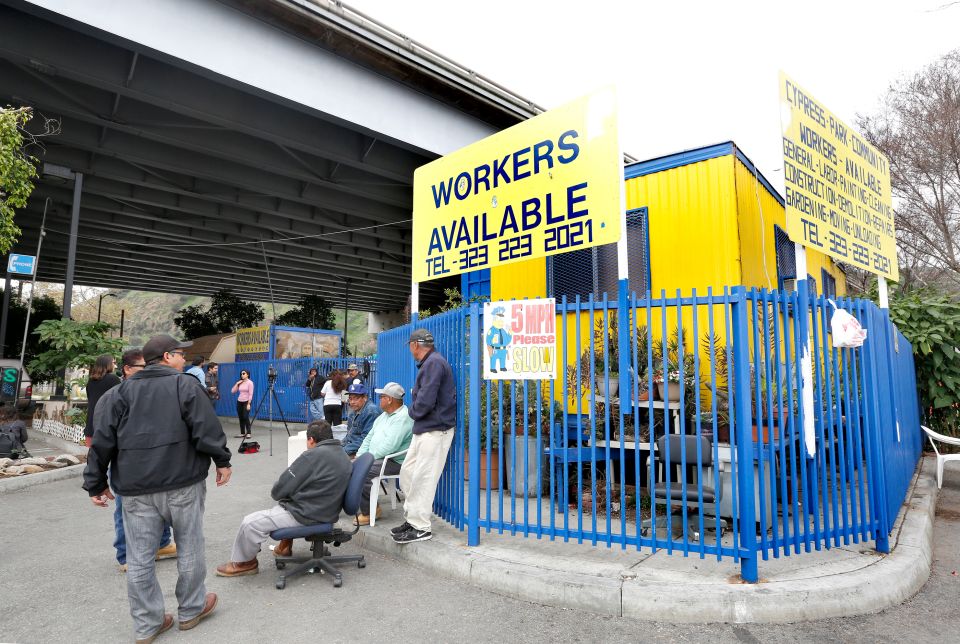The state aid offered to immigrants is considerable, but it has been insufficient, reveals a study
“Ask any undocumented worker who has also worked in other states,” suggested Antonio Martínez, “and, no, well, it doesn’t even compare, because here in California they let you work in peace.”
Martinez put up roofs in Texas and in southern Arizona he picked fruit one summer; In southern California, he has worked “from what I can find, from what is offered” and although the rent seems excessive to him – “it is crazy” – his income is enough to cohabit an apartment, for his expenses and for remittance every two months.
In 2020 he got Covid 19 and last year he had a relapse. Without working those periods, he got ahead with loans from his friends and acquaintances, he talked in a phone call.
The circumstances that Antonio Martínez, 35, faces in California are similar to those that some 150,000 undocumented workers or “irregular workers” experience every day, according to a study by the University of California.
Until now, the state of California has granted irregular workers driver’s licenses, health care services, tuition fees similar to those of legal residents and citizens.
They also have a “sanctuary state” in which police and officials are prohibited from collaborating with migration agents, and a new law will give them official IDs, among other perks.
But they are also the workers who face the greatest economic insecurity, the children who directly or indirectly depend on them, at least six out of ten in the state, are minors from low-income families.
They also initially faced the most vulnerable and deadly conditions in the pandemic, and while all California residents are at potential risk of environmental disasters, the danger is most latent in areas where immigrants working in irregular or undocumented conditions usually live. .
This is what researchers Edward Flores, Ana Padilla, Rodrigo Alatriste Díaz and Karina Juárez found at the University of California at Merced, in a study funded by the California Endowment Foundation.
Irregular workers make up six percent of California’s workforce, but they hold one in 16 important jobs and generate at least $3.7 billion annually in state and local taxes.
That amount translates to more than ten million dollars in taxes every day of the year.
More than half of irregular workers hold jobs primarily in factories, restaurants, and food services; building; in professional services, agriculture, retail trade and other services.
But despite their considerable contribution, “undocumented workers face much higher levels of economic insecurity; double those faced by legal residents and citizens.”
Most irregular workers have incomes considered below a “living wage,” the researchers concluded.
As a consequence, “the majority of children living with at least one undocumented family member experience economic insecurity.”
Overall, 61 percent of children living in the households of irregular workers are from families with incomes below the living wage, according to the UC; only 36 percent of children from families with regular workers face those circumstances.
Due to their circumstances, irregular workers faced more risks and havoc from the pandemic, and at least at the beginning, in 2020, they were more likely to bring the virus home.
The study also clarifies that “California faces the highest risk of major environmental disasters, including wildfires and floods. Although the risk is high in almost all counties, it is more in those with higher rates of non-citizen workers”, that is, the areas where there is more irregular work force.
The UC Merced analysis would have served to influence Gov. Gavin Newsom to approve a state law last week that would grant unemployment insurance to irregular workers, but the governor vetoed the proposal because, he said, the budget to finance a law like that’s up to the legislature, not him.
Although the issue of irregular immigration is once again at the center of Republican electoral platforms, in California the candidates of that party have refrained from running anti-immigrant campaigns.
Representative to the California legislature for the Federation for American Immigration, a nonprofit organization opposed to irregular immigration, David Jaroslav, said his group disagrees with supporting undocumented workers.
The representative explained that granting benefits to irregular workers “contradicts the federal migration law”, assured that they are paid by taxpayers and that, therefore, they are contributions that deserve to be invested in other areas.
He warned that as long as California provides benefits to irregular workers, it will act as a magnet for more migrants to arrive.

